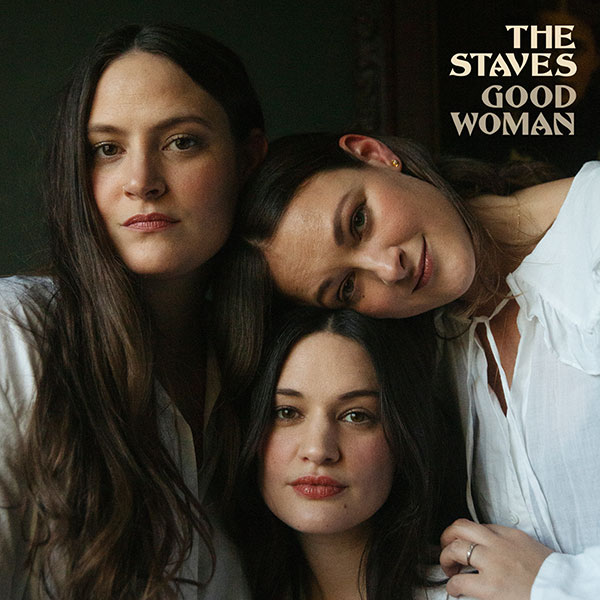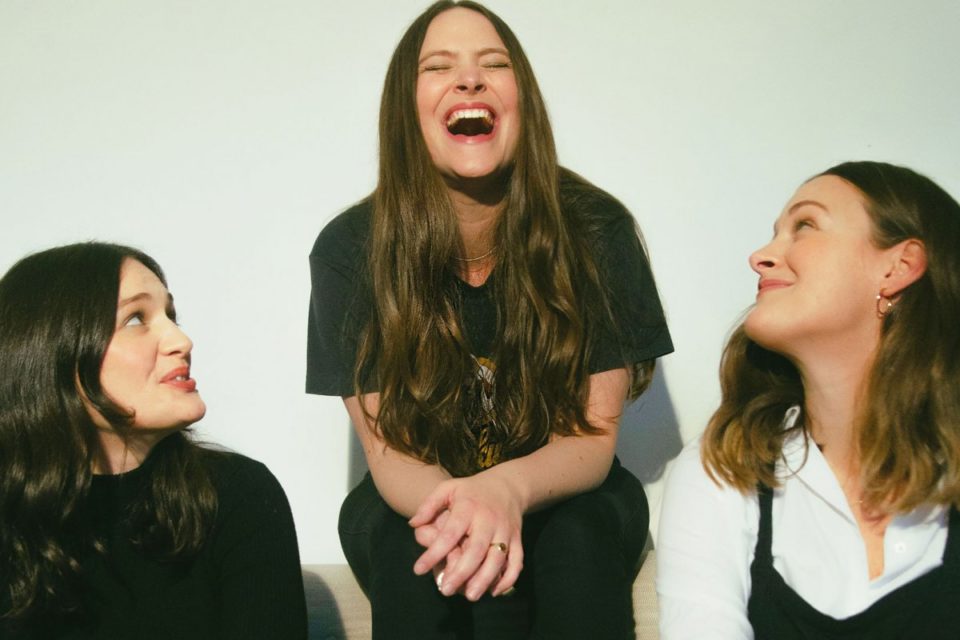About The Record
British sister trio The Staves, made up of Emily, Jessica and Camilla Stavely-Taylor, reflect on tragedy, transition and strength on their third album, and first collection of original material in six years, Good Woman. They’ve weathered many major life events in recent years: the death of their mother; Camilla’s break-up and return to the U.K. after a stint in the U.S.; the birth of Emily’s first child. After sharing a childhood and spending their young adulthoods intertwined artistically, The Staves’ personal upheaval, followed by the isolation of 2020, forced the sisters to cope and grow independently.
Their first two records were classified fairly neatly as folk-rock, but here the Staves have offered a more expansive sonic commentary on ends and beginnings, on loss and a regaining of self. The resulting 12 tracks bridge the tension between “lazy and strong” during “Devotion,” remain open-hearted though weary in “Trying” (“I’ll be here trying”) and raise middle fingers defiantly to end “Failure” (“I don’t owe you anything”). By teaming up with L.A. producer John Congleton, credited for the recent sounds of St. Vincent, Sharon Van Etten and Nashville’s own Bully, The Staves layered sonic lushness—claps, snaps, assertive drums and swelling synths—underneath their stunning three-part harmonies.
Although written pre-pandemic, their sentiments on adulting, like “You’re working on yourself and you’re killing it,” find timely delivery in early 2021, as we continue self-soothing. Thankfully, this Good Woman refuses to be quiet or still.

Artist: The Staves
Project: Good Woman
On the Record: Q&A with The Staves
Celia Gregory: It’s lovely to meet you all. Milly, are you in the same city as Jess right now?
Camilla Stavely-Taylor: Yes, we’re actually only a 25-minute walk away from each other. So not too far.
Jessica Stavely-Taylor: It’s all we ever do now, is walk. It’s like, “I’m just going to walk around London now aimlessly.” But we haven’t really seen that much of each other. It’s weird. We mainly see each other on Zoom and stuff like that.
CG: Different than promoting your previous records, when you were able to do all this in person?
CST: And play actual gigs, as well. It seems like a dream.
CG: Can you tell us about the evolution of the songs on Good Woman and how they’ve taken on new meaning over time?
CST: The making of this album from start to finish ended up spanning a lot longer than we initially would have ever planned for. We started demoing in 2017 with a view to try and make something that was, I think, bolder-sounding than we’ve done before; to play with a lot of different sonic ideas and to lyrically be a little braver and a little more upfront and less shrouded in metaphor and things like that.
JST: I think with this record, we’re older. We’re more confident in who we are as individuals, as women, as a band. And I think you realize the older you get that life is short and you need to be able to speak your truth and say what it is you need to say and not be afraid of it. I feel like “unafraid” is maybe the way that I would describe it, if I could in one word.
CG: Does that resonate with you, Milly?
CST: It definitely does. So much changed in our lives from the beginning of making this album to finishing it. And we sadly lost our mother in 2018. So we had to take a really long break just to rest and recover, and a very significant relationship of mine ended very shortly afterwards. So I was living out in America and then I had to move back, and then Emily got pregnant and had a little baby. There were just all these huge, seismic changes. This album, having been made through the most turbulent period of our lives, it feels like closing a chapter and starting a new one. Really, it feels very cathartic to tie that up. It feels like drawing a line under that particular chapter of our lives, which feels very healthy, feels very good.
CG: I like that you used the word “healthy.” Parts of the record are sweet and reflective, and others are more “middle fingers up,” like you’re closing this chapter. There’s a tension between looking back and looking forward. Do you think it’s going to be strange performing these songs that reflect a past chapter in your lives?
CST: I mean, we haven’t really had a chance to play most of them live. And that’s such a massive thing in terms of the lifespan of a song, because it always inevitably evolves as you get out on the road and you play them for people. So I think that we will be able to mold it into something that won’t feel like old news for us.
CG: I want to hear more about the making of the record. You intended to self-produce it, and then these life events happened. So what drew you to team up with producer John Congleton? Was there something about the work he’d done with Bully, Sharon Van Etten, St. Vincent and other artists that convinced you he could supply what you were looking for?
JST: Everything he does, it feels very bold and very committed. He’s very confident with just going with an idea and pushing it as far as you want to take it. We’d reached the point where we’d amassed almost an album’s worth of songs and were feeling like we needed someone to step in and help us get this to the finish line, because we’d lost perspective on whether it was even any good anymore. I think the boldness that we mentioned before, we’d lost sight of that maybe and had had time to overthink things.Listening to the stuff John had done, I think he worked really well with drums in particular; he’s a bit of a machine with making them sound just huge. I just felt like he would be such a cool person to get in a room with.As you mentioned, he’s worked with tons of really great female artists. I don’t particularly seek out someone for that reason, but it did feel like this makes a lot of sense right now, especially as we’re going to call this record Good Woman.
CG: The third track, “Careful, Kid”—with the lyrics, “You’re working on yourself and you’re killing it”—I feel like that’s my 2021 anthem, a song for turning away from some of the drama and trauma of 2020. Is it any sort of self-soothing or salve emotionally to finally release these songs to fans?
JST: I mean, it always is to let that stuff go. They say “a problem shared is a problem halved.” To sing about these things and have other people singing along or saying, “Yes, I totally feel the same,” you feel so much less alone, and I think it can dissolve some of that tension. You sort of think, “I’m not actually as angry as I was when I wrote that now.”It’s been strange for us, because some of these songs were written quite a long time ago when we first started demoing. Our relationships to those songs have changed over these last four years anyway, before we’ve even released the record, because we’ve had time for them to almost take on new meanings as different things have happened to us and our experiences. It’s like, “Wow, was I almost predicting that in this song?”
We have songs on the record called “Paralysed,” “Nothing’s Going to Happen,” “Next Year, Next Time,” and someone was saying, “Did you write this record in lockdown?” No, we didn’t. But we were obviously going through that experience in some way, taking time out and stopping. I think it’s going to be interesting to see how other people interpret those songs in this time.
CG: How did you approach the vocal arrangements? Is it primarily whoever wrote the song singing lead?
CST: There’s a lot of three-part harmony. In terms of who seems to lead, it usually just feels very natural if they are particularly personal lyrics as well, that that person leads it and phrases the words in the way they see fit. That’s usually the road we take.
JST: I think in the process of writing this, we were geographically apart from each other. Emily and I were in England and Milly was still in the U.S., so we were quite separate in the writing process, whereas normally someone would have an idea and you get together and all work through the song. Emily typically would join in at a later stage in the songwriting process. So it was like her involvement was not even happening yet in the songs, and just Milly and I were writing songs separately.At one point we felt, “Is this even going to be a Staves record or is this just like us individually doing our own thing? Should this be the time we do solo records?” We spent our whole lives together as sisters and all our 20s on the road together, being band mates, best friends. It was the first time we had that real space. I think that there are quite a lot of different identities on the record on each song, but I think John especially helped tie everything together and make it feel like one body of work.
CG: Even though you grew up in the U.K., it seems like your formative listening was similar to mine growing up in the southeastern United States. So what have you been digging on lately? Have you turned to old favorites for comfort?
CST: We’ve all been listening to an album by Bonny Light Horsemen, which is just gorgeous, really beautifully arranged music, and it’s incredibly comforting and it just sounds so good. That’s been a real comfort and happiness record for me during this time.
JST: I’ve been listening to Caroline Polachek, who I love, who’s in the band Chairlift. She’s a great pop writer, great singer. Christian Lee Hutson, whose debut record came out in 2020; Beginners is great. There’s a girl called Skullcrusher who’s awesome. She’s got a great EP out. There’s been some really cool music coming out. But I’ve also been definitely listening to stuff from our childhoods. I mean, I don’t know what records you were thinking of, but we listened to a lot of Crosby, Stills & Nash, Joni Mitchell and Simon & Garfunkel. And I think comfort is so important right now. The Beatles I always go back to, and I’ve been listening to lots of Quincy Jones albums—things that you want to dance to, things that you want to cry to, all of those things you need. Right now, music is more important than ever. I think people need it. I mean, I certainly do. I think it’s a good time to actually be putting music out. The more I think about it, I think we’re going to be fine.

